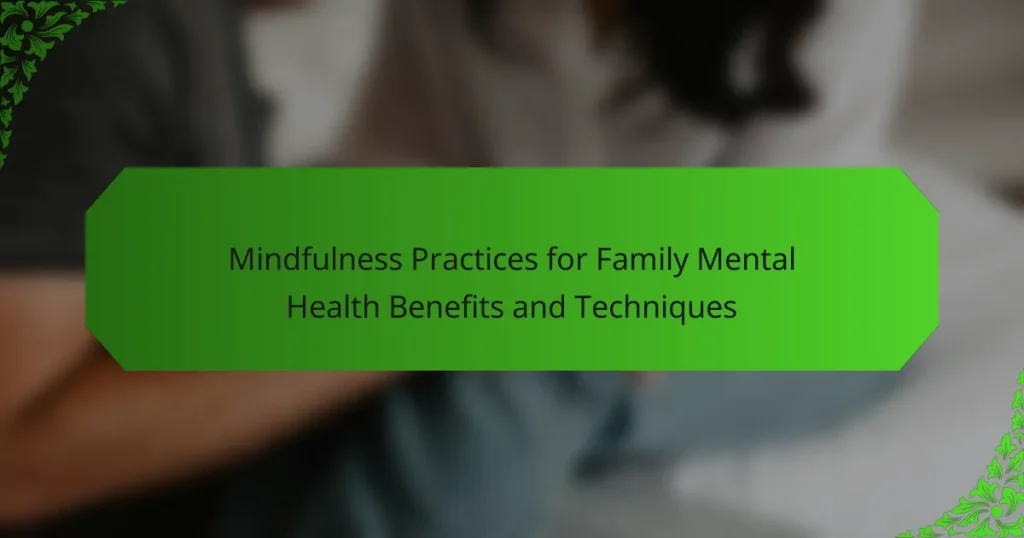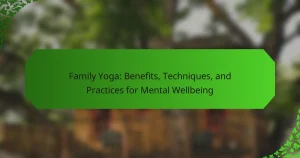Mindfulness practices significantly enhance family mental health by promoting emotional regulation and connection. Techniques like mindful breathing and body scans reduce stress and foster calmness. Engaging in gratitude exercises strengthens family bonds, while regular group meditation cultivates a shared sense of peace. Integrating these practices into daily routines improves communication and emotional resilience within the family.
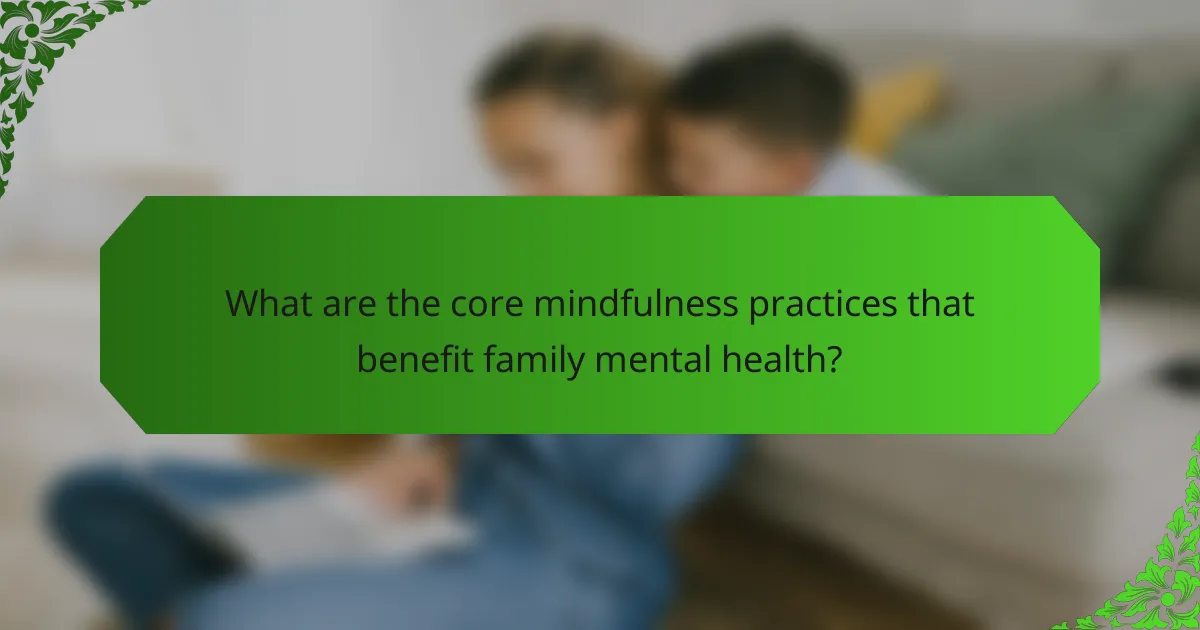
What are the core mindfulness practices that benefit family mental health?
Mindfulness practices enhance family mental health by promoting emotional regulation and connection. Key techniques include mindful breathing, which reduces stress and fosters calmness, and body scans, helping family members tune into physical sensations and emotions. Engaging in gratitude exercises strengthens family bonds by encouraging appreciation for one another. Regular group meditation sessions can cultivate a shared sense of peace and understanding. Integrating these practices into daily routines can significantly improve communication and emotional resilience within the family.
How does mindfulness contribute to emotional well-being in families?
Mindfulness enhances emotional well-being in families by fostering connection and reducing stress. It encourages open communication, allowing family members to express feelings without judgment. Mindfulness practices, such as meditation and deep breathing, can lower anxiety levels, promoting a more harmonious home environment. Families that engage in mindfulness together often report improved relationships and emotional resilience, which are crucial for navigating challenges.
What specific techniques enhance mindfulness for family interactions?
Practicing mindfulness enhances family interactions through techniques like active listening, shared breathing exercises, and mindful meals. These methods promote connection and emotional awareness. Active listening fosters understanding, while shared breathing creates a calming atmosphere. Mindful meals encourage presence and appreciation, strengthening family bonds.
What are effective breathing exercises for families?
Effective breathing exercises for families include deep belly breathing, box breathing, and 4-7-8 breathing. These techniques promote relaxation and enhance mental clarity.
Deep belly breathing encourages full oxygen exchange, reducing anxiety. Box breathing involves inhaling for four counts, holding for four, exhaling for four, and holding again for four, fostering focus. The 4-7-8 technique entails inhaling for four counts, holding for seven, and exhaling for eight, which aids in stress relief.
Incorporating these exercises into family routines strengthens emotional bonds and improves mental health outcomes. Regular practice can lead to a calmer home environment and better coping strategies for stress.
How can guided imagery be used in family settings?
Guided imagery can enhance family mental health by fostering connection and reducing stress. Families can practice guided imagery together by creating a calm environment, selecting a theme such as relaxation or adventure, and using verbal prompts to guide visualization. This technique promotes emotional bonding and encourages open communication. Regular practice can lead to improved emotional regulation and resilience within family dynamics.
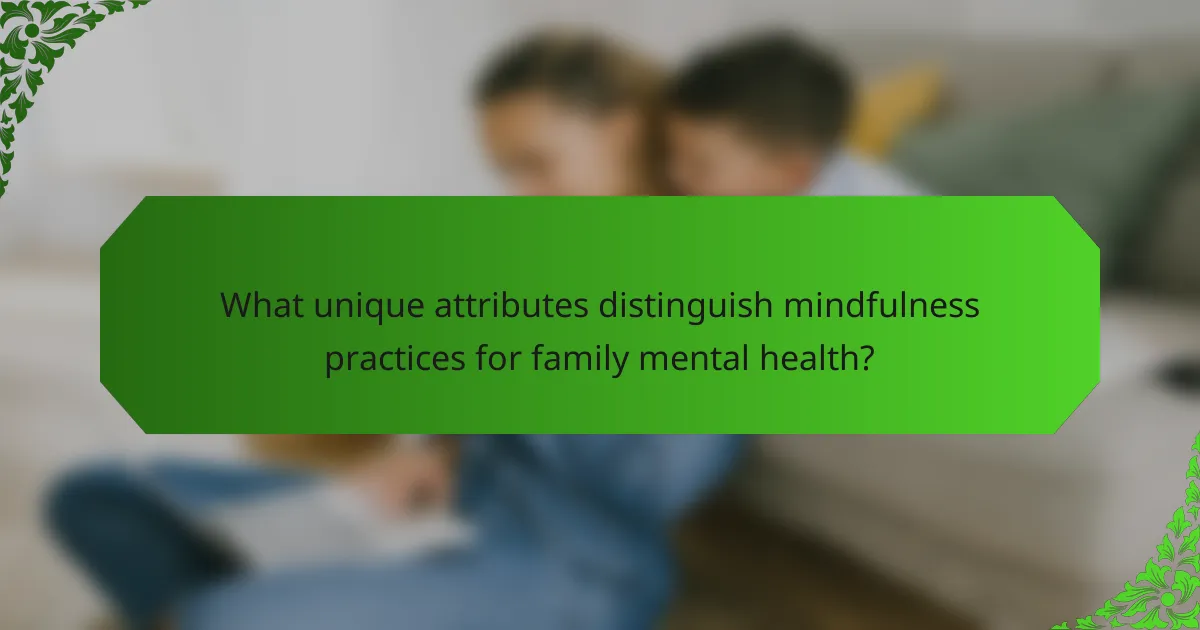
What unique attributes distinguish mindfulness practices for family mental health?
Mindfulness practices uniquely enhance family mental health by fostering emotional resilience, improving communication, and promoting empathy. These practices help families manage stress and conflicts through techniques like mindful breathing and shared meditation. Unique attributes include the ability to cultivate a supportive family environment and the potential for intergenerational benefits, where skills learned can be passed down. Such practices also prioritize collective well-being, distinguishing them from individual mindfulness approaches.
How does family structure influence the effectiveness of mindfulness practices?
Family structure significantly impacts the effectiveness of mindfulness practices. Families with supportive dynamics enhance individual engagement in mindfulness, leading to improved mental health outcomes. For example, cohesive families can practice mindfulness together, creating shared experiences that reinforce emotional bonds. Conversely, families with conflict may struggle to adopt mindfulness, as stress can hinder participation. Research indicates that structured family environments promote routine mindfulness practices, fostering resilience and emotional well-being. Thus, the family structure serves as a crucial factor in determining the success of mindfulness interventions.
What role does cultural background play in mindfulness adoption?
Cultural background significantly influences mindfulness adoption by shaping perceptions and practices. Different cultures have unique approaches to mindfulness, affecting how individuals integrate these techniques into family mental health. For example, Eastern traditions often emphasize meditation and awareness, while Western practices may focus on therapy and cognitive techniques. These variations can impact the effectiveness and acceptance of mindfulness within family dynamics. Understanding these cultural nuances can enhance the implementation of mindfulness practices, fostering better mental health outcomes for families.
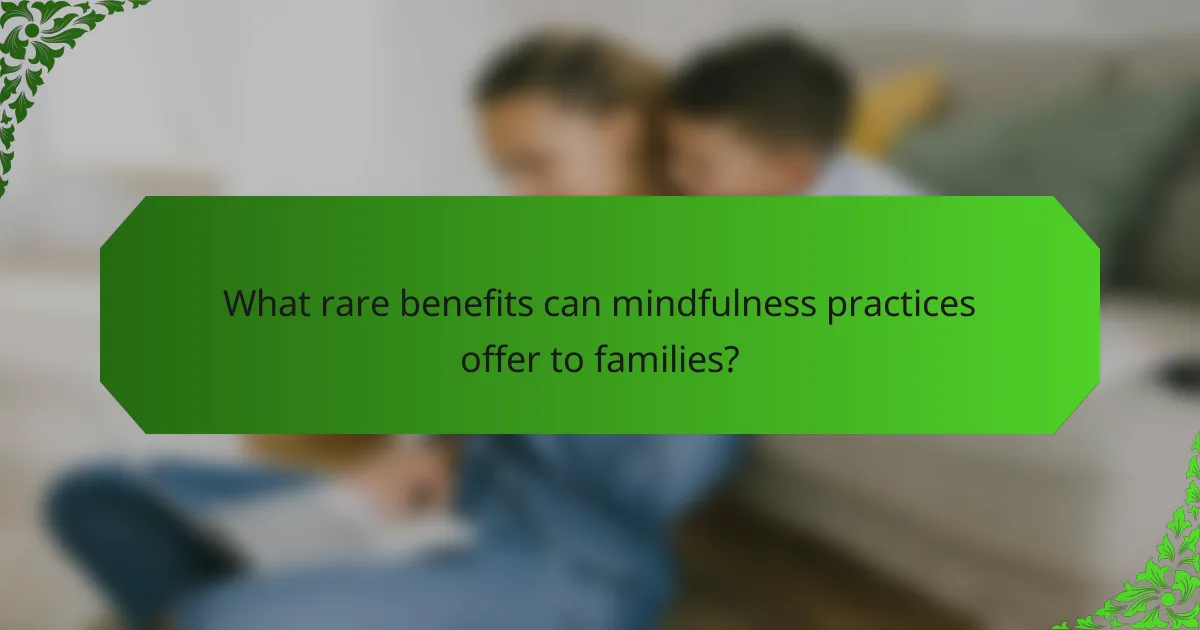
What rare benefits can mindfulness practices offer to families?
Mindfulness practices can offer families unique benefits such as enhanced emotional regulation, improved communication, and increased resilience. These practices foster a deeper connection among family members, reducing stress and promoting a supportive environment. Research indicates that families engaging in mindfulness report greater overall satisfaction and harmony. Additionally, mindfulness can cultivate empathy, allowing family members to understand each other’s perspectives better, which is a rare advantage in familial relationships.
How can mindfulness improve conflict resolution among family members?
Mindfulness can significantly enhance conflict resolution among family members by fostering empathy and reducing reactivity. Practicing mindfulness helps individuals remain present, allowing for better communication and understanding during disagreements. Techniques such as deep breathing and active listening promote a calm environment, which can lead to more constructive discussions. Research indicates that families who engage in mindfulness practices report improved relationships and decreased stress levels, enhancing overall family mental health.
What unexpected outcomes have been observed in families practicing mindfulness?
Families practicing mindfulness often experience unexpected outcomes such as improved communication, enhanced emotional regulation, and increased resilience. These benefits can lead to a more harmonious family environment. For example, mindfulness can reduce stress levels, fostering a sense of calm that positively influences family interactions. Additionally, children exposed to mindfulness practices may develop better focus and empathy, contributing to healthier relationships. Studies show that families engaging in mindfulness report greater overall satisfaction and connection, highlighting its transformative potential in family dynamics.
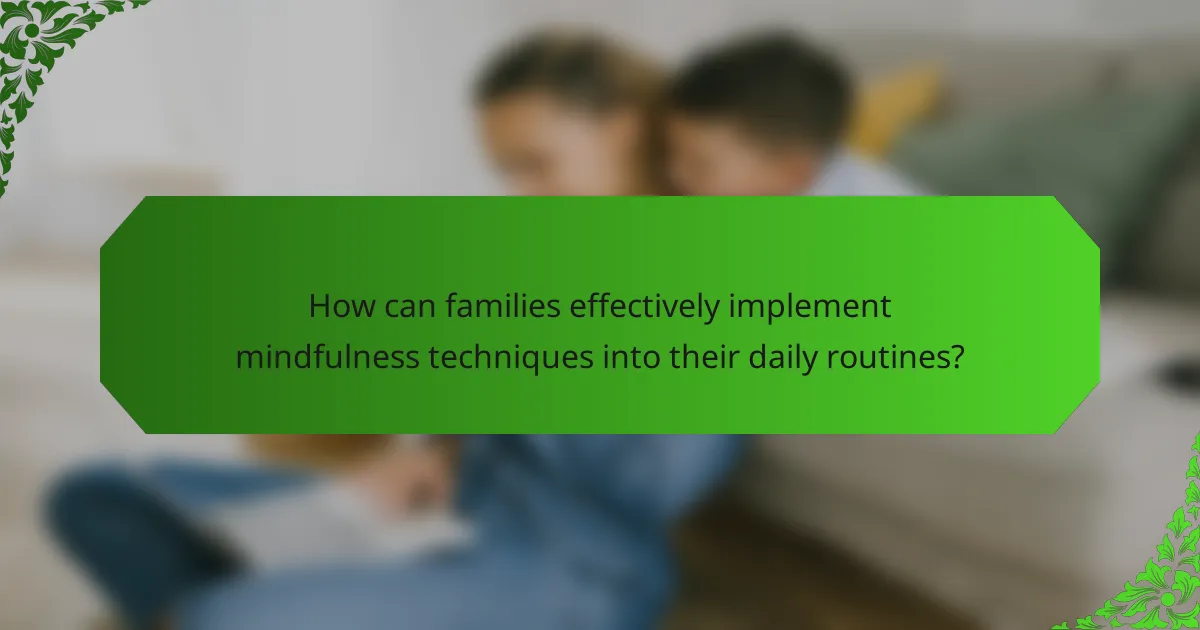
How can families effectively implement mindfulness techniques into their daily routines?
Families can effectively implement mindfulness techniques by integrating simple practices into their daily routines. Start with short, focused breathing exercises during meals to enhance presence and connection. Encourage family members to share their feelings during designated times, fostering emotional awareness. Incorporate mindful activities like nature walks or cooking together, which promote engagement and reduce stress. Establish a consistent family mindfulness practice, such as evening reflections, to strengthen bonds and enhance mental health.
What are the best practices for integrating mindfulness into family life?
Integrating mindfulness into family life enhances mental health and strengthens relationships. Start by establishing a daily mindfulness routine, such as family meditation or mindful meals. Encourage open conversations about feelings and experiences, fostering emotional awareness. Incorporate mindfulness activities like nature walks or yoga, promoting physical and mental well-being. Set aside technology-free time to connect and engage with one another, enhancing presence and focus. Lastly, model mindfulness behaviors as parents, demonstrating its importance and benefits.
What common mistakes should families avoid when practicing mindfulness?
Families should avoid common mistakes such as inconsistency, unrealistic expectations, neglecting individual needs, and lack of guidance. Inconsistent practice can hinder progress, while unrealistic expectations may lead to disappointment. Each family member may have unique mindfulness needs, and overlooking these can reduce effectiveness. Lastly, without proper guidance, families might struggle to implement techniques successfully.
What expert insights can enhance mindfulness practices for families?
Incorporating expert insights can significantly enhance mindfulness practices for families. Techniques such as structured family meditation sessions, mindful communication exercises, and gratitude journaling foster deeper connections and emotional resilience.
Research indicates that families practicing mindfulness together experience improved mental health outcomes, including reduced anxiety and enhanced emotional regulation. For instance, a study found that families engaging in regular mindfulness activities report a 30% increase in overall well-being.
Unique attributes like tailored mindfulness activities for different age groups can further enhance engagement. For example, younger children may benefit from playful mindfulness games, while teenagers might prefer guided meditations focusing on stress management.
As a result, integrating expert insights into family mindfulness practices can create a supportive environment, promoting mental health and strengthening family bonds.
